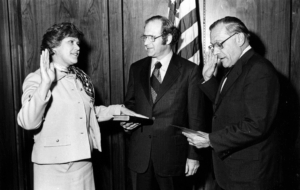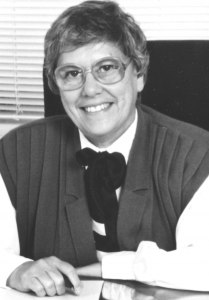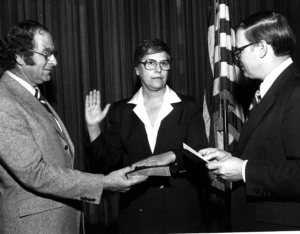Janet Norwood (1923–2015): A Pioneer and an Inspiration
Val Nirala, ASA Publications Coordinator
“When I grow up, I want to be like Janet Norwood because she was a past president of [the] American Statistical Association. …She’s actually pretty neat.”
These are the words of a middle school student named Holly who lives in North Carolina. Janet Norwood, previous Commissioner of the Bureau of Labor Statistics, visited Holly’s school in 2003 to talk about her work in the U.S. government. As someone who was a pioneer at heart, it is no surprise that Norwood would inspire the life of a young girl. Norwood was the first female Commissioner of the BLS, appointed by President Carter in 1979 and reappointed twice by President Reagan. She also led the way for women desiring professional careers in the 1950s, when she decided to put off having children in order to climb the government career ladder instead.
Norwood describes the 1950s as a period when it was difficult to get a job. Her husband, Bernard, who she married during her sophomore year at Rutgers University, worked for the State Department and helped her bypass a would-be secretarial job in order to land a position in Brussels, Belgium, where she was able to put her education to use. “Women have to take advantage of the opportunities presented to them; it often isn’t quite as straight a career path as it is for men,” said Norwood.
Norwood credits her husband as being a large part of her success. “I think the person who influenced me most was my husband, who has always encouraged me to strive for more and to do more. He has really always been supportive. I think that for a married woman to have a career, she needs to have a husband who is very secure and not competitive with her.”

Being sworn in as Deputy Commissioner of BLS—Janet Norwood, Bernard Norwood, and Secretary of Labor John Dunlap
And a career Norwood has had. As Commissioner, she spent much of her time testifying before Congress. She also oversaw nearly 3,000 employees. She once said of her job, “We are responsible for some of the most sensitive of the economic data. These data figure very prominently in most of the political debates, so it is extremely important that they be accurate and of high quality.”
“I believe strongly that an objective, scientifically created system of data is essential for a democracy to flourish.”
To Norwood, the most interesting—and challenging—aspects of the government’s statistical programs are the definition of unemployment, the measurement of race in the decennial census, and the political controversy surrounding undercounting minorities. All of these have caused controversy throughout time and, according to Norwood, each has the potential to impact the changing problems in the United States. Perhaps because of the impact these and other statistical aspects have on policy, Norwood views her time at the BLS as a period when she was able to help create an informed citizenry. “I believe strongly that an objective, scientifically created system of data is essential for a democracy to flourish,” she said.
Indeed, Norwood believes so much in objective data that she once had to stand up to President Nixon when he tried to force the BLS to change its press releases and comments on what data meant. She also had to correct President Reagan when he misspoke to the media and said, “When the Bureau of Labor Statistics doesn’t like the data, they change them.” He was referring to the seasonally adjusted unemployment rate that was lower at the time than the unadjusted rate. Norwood explained, “We publish the unemployment rate both before and after seasonal adjustment to account for when large numbers of college students enter the workforce looking for jobs at the end of the college year. It’s important to know that that occurrence at the same time each year does not mean the country is suddenly entering a recession!”
Norwood also believes in supporting the people she works with. In fact, she considered nurturing a culture of independence and excellence the most important part of her job at the BLS. “I think that a good manager has to understand the people who work for [him or her],” she said. “I don’t believe in the command and control philosophy. What I always tried to do was to get people to do what I thought they ought to be doing because they wanted to do it.”
Even today, Norwood sustains an interest in the people working to protect the integrity of data. She said recently, “I continue to maintain a strong interest in the system and try to help in any way that I can. We are really lucky to have so many good people dedicated to the collection and interpretation of statistical information that is accurate, objective, and relevant.”
In 1991, Norwood decided she could bring about more positive change if she were outside the system, so she joined the Urban Institute, where she wrote papers and testified before Congress about various political issues. Today, she chairs the panel on “Food Insecurity and Food Insecurity with Hunger” for the National Academies Research Council Committee on National Statistics (CNSTAT) in addition to the panel on “Offshoring of Employment” for the National Academy of Public Administration (NAPA). She also chairs the Advisory Committee on Leading Indicators at the NY Conference Board, and, as a Senior Fellow and Counselor, provides occasional advice on their statistical programs. Additionally, she serves as a member of the Executive Committee on the Board of Directors of the National Opinion Research Center (NORC) at the University of Chicago and is active in the Cosmos Club as a Past President and member of the Admissions Committee.



















